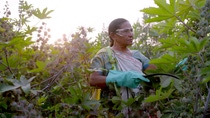Media
BASF and its partners publish 2024 results of the world’s first sustainable castor bean program, Pragati
- Certification of more than 8,000 farmers and significant increase in yields
- More than 9,000 hectares of mostly semi-arid land repeatedly farmed according to the SuCCESS® sustainability code
- Third program phase (2023-2026) places heightened emphasis on fostering the involvement of women in sustainable castor farming
Ludwigshafen, Germany, and Gujarat, India, February 4, 2025 – Pragati, the world’s first sustainable castor bean program, completed eight years of operation in the 2023/2024 season. More than 8,000 farmers are now certified under the program, and individual farmer yields have increased significantly. The program has grown to more than 9,000 hectares of mostly semi-arid land under the SuCCESS® sustainability code (see www.castorsuccess.org). BASF, Arkema, Jayant Agro-Organics and the project implementing organization Solidaridad jointly launched the project in May 2016. The program members updated the results and impacts of the program for 2024:
- More than 10,000 farmers have been trained, and more than 8,000 of them certified.
- About 100,000 metric tons of certified castor seeds have been under cultivation, a significant increase over the previous year (74,500 metric tons). This growth ensures a continuous supply of sustainable castor beans to the global supply chain.
- In the crop cycle 2023/2024, SuCCESS-certified farmers realized 57 percent higher yields than that published by the local government for the region.
- Over 9,000 hectares were farmed according to the SuCCESS code in 2023/2024, for a total of more than 36,000 hectares since the start of the program. Pragati farmers are increasing the amount of land devoted to castor farming as it is seen as a profitable crop.
- The practices adopted in the Pragati program have resulted in a lower water consumption compared with conventional practices. Data measured in the demonstration plots for these practices showed about 33 percent less water consumption.
- Over 8,200 personal protective equipment (PPE) kits and 5,500 crop protection storage boxes were distributed free of charge.
- In 2024, more than 100 medical camps organized in all project villages monitored the health of over 6,000 project and 2,300 non-project farmers, workers and their family members. Nearly 50 percent of those monitored were women.
- During the year, more than 420 capacity-building training sessions were conducted with the farmers.
- Over 700 lead farmers were identified and trained to provide leadership to certified farmer groups.
In accordance with the strategy for the current phase, the project placed a particular emphasis on gender. This year, more than 1,100 women from 17 project villages enrolled in the program and received in-depth training on good agricultural practices. This training aims to raise productivity while fostering safe, sustainable and regenerative agriculture. All participants also took part in the program's digital and financial literacy module.
“As a widow, I carry the burden of my family on my shoulders alone. Thanks to the Pragati program, I have been able to improve my farming practices and better support my family,” says Patel Sitaben Rameshbhai, a castor oil farmer from Kahoda village in Gujarat's Mehsana district. “The good agricultural practices I have learnt have helped me reduce the cost of cultivation by 20 to 25 percent. I have also started using certified seeds, which help me grow healthier crops and produce more. With the savings I made, I was able to buy a new machine for my son's motor repair shop. It feels like I have made real ‘pragati’ – progress for me, my family and my community,” adds Sitaben, who now helps her fellow farmers practice safe and sustainable castor farming.
Next year, the Pragati program will celebrate its tenth anniversary. Launched following the completion of a baseline survey of over 1,000 castor oil farmers in Gujarat, India, the initiative identified the profitability and ease of cultivation of castor oil as key factors. Since then, the project has aimed to increase yields and farmer incomes by adopting sustainable agricultural practices, promoting good waste management practices, ensuring efficient water use, maintaining soil fertility, and implementing better health and safety measures while respecting human rights. In 2025, the achievements made over the past xears will continue to drive progress in sustainable castor oil production.
About the Care Chemicals division at BASF
BASF’s Care Chemicals division offers a broad range of ingredients for personal care, home care, industrial & institutional cleaning, and technical applications. We are a leading global supplier for the cosmetics industry as well as the detergents and cleaners industry, and support our customers with innovative and sustainable products, solutions and concepts. The division’s high-performance product portfolio includes surfactants, emulsifiers, polymers, emollients, chelating agents, cosmetic active ingredients and UV filters. We have production and development sites in all regions and are expanding our presence in emerging markets. Further information is available online at www.care-chemicals.basf.com.
About BASF
At BASF, we create chemistry for a sustainable future. We combine economic success with environmental protection and social responsibility. Around 112,000 employees in the BASF Group contribute to the success of our customers in nearly all sectors and almost every country in the world. Our portfolio comprises six segments: Chemicals, Materials, Industrial Solutions, Surface Technologies, Nutrition & Care and Agricultural Solutions. BASF generated sales of €68.9 billion in 2023. BASF shares are traded on the stock exchange in Frankfurt (BAS) and as American Depositary Receipts (BASFY) in the United States. Further information at www.basf.com.
P-25-013


